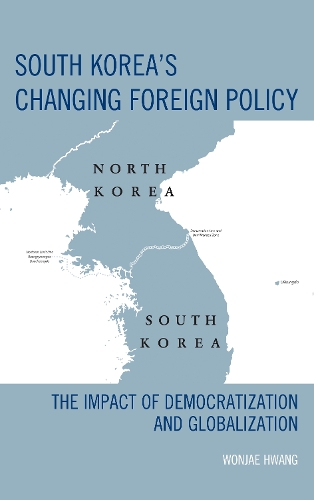
South Korea's Changing Foreign Policy: The Impact of Democratization and Globalization
(Paperback)
Available Formats
Publishing Details
South Korea's Changing Foreign Policy: The Impact of Democratization and Globalization
By (Author) Wonjae Hwang
Bloomsbury Publishing PLC
Lexington Books
6th November 2018
United States
Classifications
Professional and Scholarly
Non Fiction
Politics and government
Globalization
Political structures / systems: democracy
327.5195
Physical Properties
Paperback
142
Width 152mm, Height 218mm, Spine 11mm
227g
Description
South Korea has experienced new challenges both internally and externally with respect to its foreign policies. Internally, democratization has changed political terrain for domestic and international politics. Democratization and the information revolution have reinvigorated civic life and citizens have become active in expressing very divergent and often polarized views on foreign policies. Democratization also promotes South Korean nationalism. Rising nationalist sentiments make it difficult for the U.S. to effectively handle regional security-related issues such as the North Korean nuclear program, balancing against China, and dealing with the potential Sino-Japanese conflict. Externally, globalization has brought significant changes to South Koreas foreign policies. Economic dimension and issues rather than security-related issues become salient and important. For example, although security concerns are still dominant in Korean society, economic interests necessitate South Korea improve its relations with China and redefine its political position between the U.S. and China. Globalization has also promoted Koreas national interests to reach out to other countries. The Korean government has tried to develop new economic partnerships with developing countries for the purpose of securing energy and natural resources and expanding its soft power. Economic globalization and democratization have brought about changes in South Korea that raise many interesting questions with respect to foreign policy. Has South Koreas rise as an economic power and a democracy changed its relationship with neighboring powers Does economic integration between South Korea and China reshape their relationship How about its impact on U.S.-Korea relations Are geopolitical and security-related concerns still the dominant factor in explaining South Koreas foreign policies Does economic integration between Korea and Japan help to reduce tensions or emotional animosities that derive from historical disputes Has South Korea, as a growing economic power, sought to forge relations with other middle or small powers beyond the confines of its region Overall, this book theoretically and empirically explores how democratization and economic globalization have changed domestic politics in South Korea and reshaped its foreign policies.
Reviews
This volume by Wonjae Hwang helps us understand South Koreas postwar rise from nearly complete international isolation to a position of international influence by focusing on two of the factors that were important in this transition, globalization and South Koreas transition from authoritarianism to democracy. It is required reading not just for scholars interested in the international rise of South Korea but for anyone who is interested in understanding how such processes as globalization and democratization can be embraced in a way that will assist leaders to advance their nations international status. -- Dennis Patterson, Texas Tech University
South Koreas economic and political development is an amazing story, and Wonjae Hwang has produced an excellent study of how globalization has been an important factor in these two areas. South Koreas Changing Foreign Policy provides a fascinating assessment that shows the complex interplay of globalization with South Koreas domestic politics and foreign relations with a particularly interesting focus on the role of economics and security as it navigates relations with China and the United States. -- Terence Roehrig, United States Naval War College
Hwang argues convincingly that Korean democratization and globalization explain South Koreas increasingly important role in international affairs. Blending broad history with a series of well-focused quantitative analyses of trade, foreign aid, and UN voting, he shows how domestic politics and globalization explain South Koreas complex foreign policy, providing substantial insight into Koreas increasing global presence and its evolving role in Northeast Asian geopolitics. -- Jonathan Krieckhaus, University of Missouri
Author Bio
Wonjae Hwang is associate professor of political science at the University of Tennessee.
